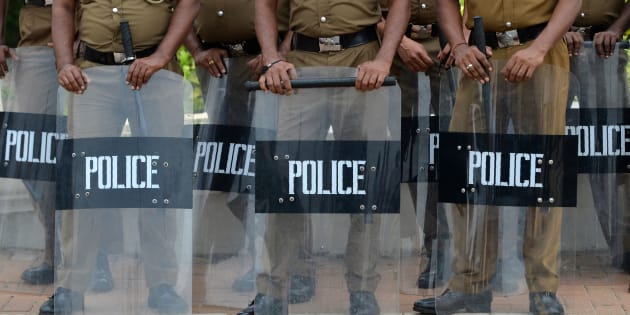スリランカ:苛酷な治安法の廃止を
(ジュネーブ)— スリランカ政府は、人権侵害を引き起こすテロ防止法(PTA)を廃止するという公約を履行していない、とヒューマン・ライツ・ウォッチは本日発表の報告書内で述べた。同法は被疑者や容疑者を訴追や裁判もなしに数カ月、しばしば数年も恣意的に拘禁するために適用されており、拷問などの人権侵害の温床である。
ヒューマン・ライツ・ウォッチのアジア局局長ブラッド・アダムズは、「スリランカ政府は、悪名高いテロ防止法廃止について、話すだけでなんら行動を起こしていない」と指摘する。「政府が人権保護について真剣ならば、この苛酷なテロ防止法を国際基準に適合した法と置き換えることを、緊急の優先課題にすべきだ。」
報告書「証拠なき投獄:スリランカのテロ防止法による人権侵害」(全46ページ)は、同法のもとで起きた、これまでおよび現在の人権侵害を調査・検証したもの。具体的には拷問や性的虐待、自白強制、適正手続の体系的な否定などがある。元被拘禁者、その家族、テロ防止法の事案を担当している弁護士などへの聞き取り調査から、同法がスリランカにおける拷問の継続に大きな役割を果たしていることがわかった。本報告書に収録した17の証言は、テロ防止法関連事案のほんの一部に過ぎないが、これらは同法の苛酷な性質とその人権侵害を浮き彫りにするものである。
タミル・イーラム解放のトラ(LTTE)に対処するために1979年に制定されたテロ防止法に基づき、26年間の内戦中に数百人が拘禁された。2009年5月に内戦が終了して以来、その他の非常事態関連規定は廃止されたが、同法は効力をもったままだ。
スリランカ政府は、2016年にテロ行為の疑いで少なくとも11人にテロ防止法を適用して逮捕している。
テロ防止法は、不特定の「違法行為」に対し令状なしで逮捕を認めるもので、被疑者を出廷させずに最長で18カ月の拘禁を許す。ヒューマン・ライツ・ウォッチは、10年あるいはそれ以上にわたって、法律家へのアクセスもなしに拘禁された末、免訴されたり、訴追もなしに釈放された複数のケースの報告を受けている。これらの人びとは、賠償や補償、あるいは謝罪も受けていない。2017年7月に公開された政府統計によると、70人超の囚人が審理前の状態で5年以上、12人超が10年以上拘禁されている。
同法の下で拘禁された人の多くは、自白を引き出すために拷問されたと証言。本報告書にその詳細が記されている17人のうち、11人が殴打や拷問を受けたと話す。ヒューマン・ライツ・ウォッチはこれまでにも、治安部隊が被拘禁者をレイプしたり、性器や胸に火のついたタバコを押し付けたり、殴打や電気ショックでけがを負わせたケースを調査・検証してきた。
テロ防止法関連の事案を扱うある上級裁判官は、2017年に担当した事案のうち90%超で、自白証拠の除外を余儀なくされたと語る。自白が力づくの方法で取得されたものだからだ。元被拘禁者たちは投獄と虐待の結果、心理的および身体的な外傷に苦しんでいることが多い。
テロ防止法は、拷問やその他の虐待行為に関与する治安部隊員に、その行動が誠意のすえ行われていたり、あるいは命令に従った場合、免責を与える。また、拷問などの人権侵害行為を行う治安部隊要員に広く適用される。
国連特別手続からの報告書の多くが、テロ防止法の重大な影響に関し同様の認定を文書化している。対テロに関する国連特別報告者(当時)のベン・エマーソン氏は2017年7月のスリランカ訪問のあと、「治安上の理由で逮捕され、拘禁された人びとに対する拷問は、今日まで常態化している」と述べた。その後氏がまとめた報告書は、2016年に同法下で逮捕された者の80%が、その後、拷問ほかの人権侵害を受けていたと結論づけている。2017年10月には、移行期の法の裁きに関する国連特別報告者のパブロ・デ・グリーフ氏が、容疑者の自白だけに基づいて下されたすべてのテロ防止法に関連する有罪判決を再審理するよう求めた。
12月に2週間スリランカを訪問した後、国連の恣意的拘禁に関する作業部会は、テロ防止法を人権侵害の「主要な原動力」であるとして、即時廃止を強く求めた。また、欧州連合(EU)は、2018年1月のEU・スリランカ合同委員会協議で、同法を廃止すべきだという要請を再確認している。
スリランカ政府は、2015年10月の国連人権理事会において、責任と法の裁きに関する一連のコミットメントが示された決議案に同意した。しかし2年以上が経過した今も、テロ防止法の廃止など、治安分野の改革に関する主な公約をほとんど履行していない。国連人権高等弁務官のゼイド・ラアド・アルフセイン氏は、2017年9月の第36回人権理事会会合における開会あいさつで、スリランカの遅々として進まぬ改革に言及し、義務の遂行は単なる「官僚主義的な確認手続き」ではないとして、政府に行動を強く求めた。 11月にジュネーブで行われたスリランカの普遍的定期的審査(UPR)では、いくつかの国連加盟国が、拷問に対する保護措置の実施と、テロ防止法の廃止をスリランカ政府に求めている。
シリセーナ大統領の政権が、テロ防止法の被拘禁者を訴追または釈放するための措置を一部とってはいるが、不当に拘禁された人びとの救済措置や、拘禁下で強制された自白のみをもとに訴追および求刑された人びとへの対処に関する計画は進められていない。
政府は新たなテロ防止法をいくつか提案こそしているが、いずれも国際人権基準を満たしていない。2017年5月、テロ防止法に代わる新法案を、ほとんど国民との対話もないまま内閣が承認した。新法案はいくつかの点で改善点がみられるものの、依然として拷問などの人権侵害につながる長期間の恣意的拘禁を認めるものだ。また、あいまいかつ広範なテロ行為の定義も含まれ、平和的な政治活動や抗議活動の犯罪化に利用される可能性がある。つまり、提案された法案は、国連人権理事会への政府のコミットメントをはるかに下回るものであり、テロ防止法の下で広範かつあまりに容易に乱用されていた権限を、完全に放棄するつもりはないと示唆する内容だ。
政府は、テロ防止法の下で何十年も続いてきた過ちを永続させていく法律を制定するのではなく、スリランカの被害者団体、人権団体、国内外の専門家たちと協議し、治安と人権の両方を守る法案を策定する必要がある。同時に、より幅広い治安分野改革の一環として、テロ防止法の名の下で行われていた人権侵害に対する責任追及なども行われるべきだ。
アダムズ局長は、「2015年の人権理事会決議は、スリランカに対する国際的な精査の終わりを意味するものではない」と指摘する。「むしろ、国連加盟国がスリランカにおける改革の進展の不透明さを浮き彫りにし、必要な行動を要求するための具体的なベンチマークを示したのだ。」
報告書からの証言の抜粋は以下をご覧ください。
Vijaykumar Keetheswaran, a student in Colombo, was visiting his family in Kilinochchi when he was arrested under the PTA in June 2014. He alleges that he was tortured in custody by Terrorist Investigation Division (TID) officials during questioning about his contact with a Liberation Tigers of Tamil Eelam (LTTE) fighter:
This unit beat me on my back with sticks and poles. They stripped me naked, and beat the soles of my feet with pipes. At one point, they rubbed a chili paste on my genitals. I fainted at that point.
In July 2014, Keetheswaran was transferred to Boosa, a maximum-security prison in southern Sri Lanka where many PTA detainees have been held. He was produced before a magistrate in March 2015, after nine months in custody. “Before going to the magistrate, the TID wanted me to sign a confession, and they burned me with cigarettes,” he said.
Keetheswaran was released on bail in November 2015, but arrested again under the PTA in April 2016 and detained for five months, when the TID was searching for his brother:
When they couldn’t find [my brother], they arrested me instead. I was taken to Boosa and tortured all over again. They asked me to admit that my brother had been in the LTTE. I was hanged and beaten so badly that I admitted to it even though I don’t know if it’s true or not…. I was 13-years-old when the war ended. I didn’t even know what the LTTE was. But I’m still being harassed.
Sahan Kirthi, then 21, was arrested under the PTA in February 2007. He was at first detained for six months, during which he said he endured weeks of torture by TID officials. He told Human Rights Watch:
There was a pattern to the torture. They would take a plastic shopping bag, pour some petrol into it, and then cover my head with the plastic bag. It forced me to breathe the petrol simply to try and get some air. I was beaten on the soles of my feet. The pain was unbearable. I could feel my heart beat and I would get terrible headaches. There was also water torture, where they would put a handkerchief over my face, and put my face under a running tap with high pressure. If you breathe, the water goes into your nose and you feel like you are drowning. At the same time, you can’t really breathe because the water pressure is so high.
TID officials tried to force Kirthi to confess, even threatening to rape his sister. When he was produced before a magistrate after six months, he attempted to report the torture to judicial and medical representatives:
When I was produced before the magistrate, I started telling my story. She called us into her chambers instead and scolded me for saying that the TID had tortured me. I showed her my wounds and scars and she said, “You must have hit yourself.” … I was produced before a JMO [Judicial Medical Officer] after agreeing to sign a confession…. They would not let me read what was written down, so I have no idea what I supposedly confessed to. The JMO didn’t listen to me – there is a network between the JMO, magistrate, and TID, I am certain of that. They protect each other.
Kirthi was transferred to Welikada Prison in Colombo in June 2007 but was not formally charged until 2012. He was eventually acquitted in October 2014 after seven years in prison. Kirthi still has injuries, including loss of hearing, from the torture he endured in custody.
Malathi’s son, Kanna, was arrested by police in Matale in 2008 on suspicion of involvement with the LTTE. He was released after a week in custody and went into hiding. Malathi (a pseudonym) has not heard from him since. Shortly after Kanna’s release, TID officials returned to his house to search for him. When they learned he was missing, they arrested his wife, Durga (a pseudonym), instead. She was held in custody for six months before being produced before a magistrate, and then detained in prison for a further six years before any charges were filed. In 2015, she was acquitted of all charges and released, after seven years in detention.
Durga remains psychologically and physically impaired because of her long incarceration. Her three young children, who were 18 months, 3 years, and 7 years old at the time of her arrest, were raised by her mother-in-law. Malathi said things have been difficult for Durga:
Durga is out of prison now, but is broken. She is not strong enough to take a job on the tea estates, so does menial chores in the bungalows. We have not received any apologies or compensation for our suffering.
(2018年1月29日ヒューマン・ライツ・ウォッチより転載)
www.huffingtonpost.jp/human-rights-watch-japan/sri-lanka-severe_a_23348502/
You Might Like

